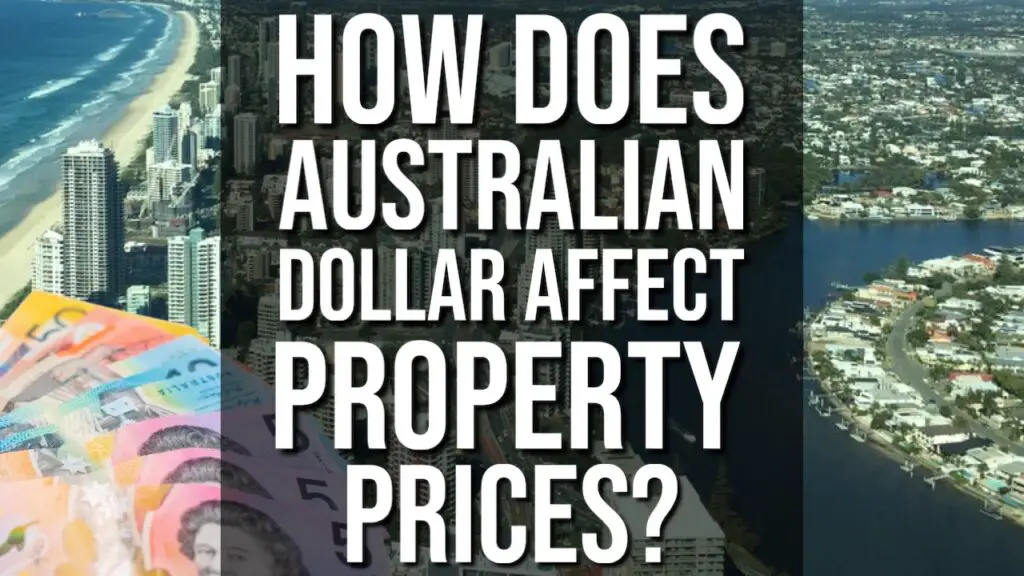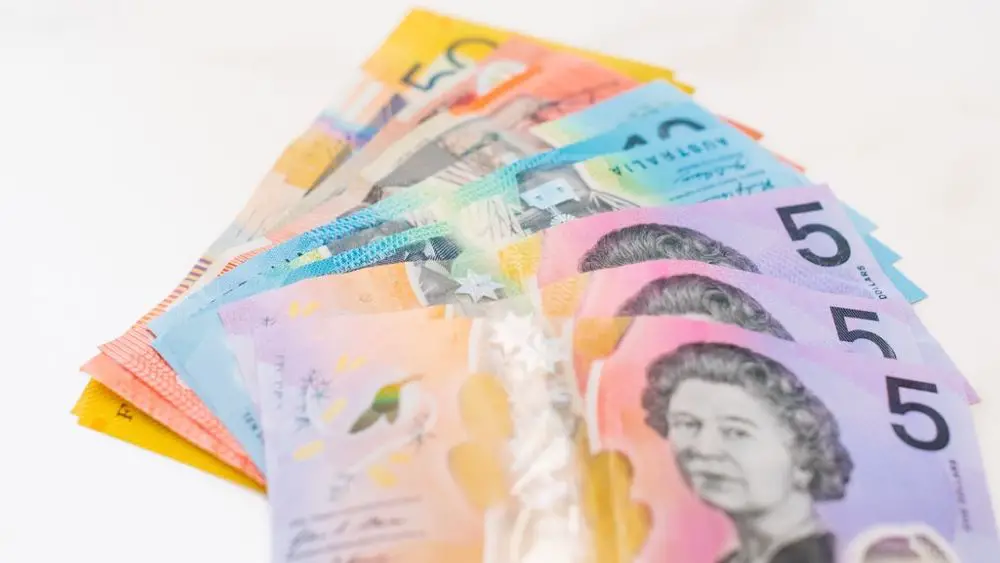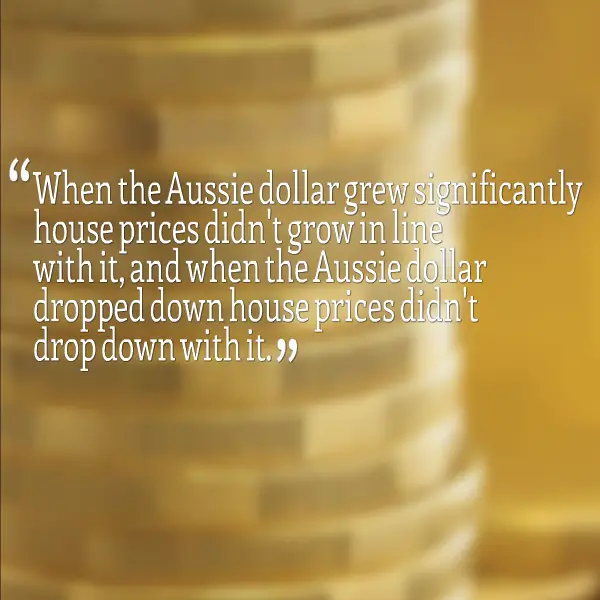How Does The Australian Dollar Affect Property Prices?

The Australian dollar has fluctuated significantly over the last 10 years or so, starting at $0.70 it grew to over $1.10 and has now fallen back to under a dollar. But how does the Australian dollar affect property prices and is there a link between the two at all?
Where Changes In The Australian Dollar DOES Affect House Prices

Let’s start by looking at where changes in the Aussie dollar may affect prices and if we can find a link or a correlation between the fluctuating Australian dollar and fluctuating house prices.
Firstly the lowering of the Australian dollar promotes tourism in Australia because then more people from outside the world can come to Australia for a cost effective holiday. This promotes tourism and means we’re more likely to have more tourists in the country. So the lowering of the Aussie dollar is going to benefit tourist dominant areas. Places like Cairns or even the Gold Coast.
The increase in the Aussie dollar can affect exports because exports become more expensive and people are less likely to pay for them because they’re based on the Australian dollar. This could negatively affect places such as mining and other micro-economic townships that rely heavily on exports. The lowering of the dollar could have a positive affects in these mining towns.
Australian Dollar Fluctuations vs Property Price Fluctuations

Looking at the fluctuations in dollar from 2003 until today. It started at $0.70 and has grown to over $1.10 and then gone back below $1.00.
However, we’ve seen consistent growth in the Australian property market over that period – even when prices of the Australian dollar went down.
From 2003 to 2011 the Aussie dollar group from $0.70 US to $1.10 or $1.11 US – that is a 57% growth rate in that period! However the median house prices in Sydney only grew 9% in that same period.
A growth of 57% vs 9%?
It doesn’t necessarily look like there’s a huge correlation there. Also, property prices continued to increase despite the Aussie dollar dropping below $1.00 US.
So when the Aussie dollar grew significantly house prices didn’t grow in line with it, and when the Aussie dollar dropped down house prices didn’t drop down with it.
It seems unlikely that we are seeing a huge correlation between the two.
The Australian Dollar Vs Other Currencies

We also need to look at what we are comparing the Australian dollar to. We only generally look at the Australian dollar against the US dollar.
But what about the a Australian dollar versus the Yen, or versus Pound, or versus the Euro?
The US dollar has fluctuations of it’s own, by only comparing the Australian dollar to the US dollar it’s not giving you a perfect idea of how the Australian dollar is growing and changing in the global market. Just looking at the comparison between two currencies isn’t going to give us a good enough idea.
And if we were able to collect all the data, there would probably so much happening in fluctuations of the different dollars that would be hard to link any changes in the Australian property market the changes in the Australian dollar compared to the rest of the world.
No Link To Go To The Bank On

So there is not a correlation that I can find that you can bank.
The property market as a whole market is affected by so many different things. You’ve got:
The reserve bank – Who have an influence on house prices with their low interest rates or raising interest rates. This obviously has a significant effect on house prices in the country.
Politicians – Changes in legislation can change house prices. Imagine if they were to take away the tax benefits of property tomorrow…house prices would probably significantly drop in value.
The economy- When the economy is booming and people are doing great (earning more money) it’s more likely that house prices are going to increase. If the economy is suffering then house prices are likely to be effected by that.
Supply and demand – This occurs locally. When supply outstrips demand prices go down, when demand is great than the supply then house prices increase.
Foreign investment – This is probably the things that influence house prices compare to the Australian dollar the most of these factors.
So in terms of the local Australian market, flucuations in the dollar is not something that I would really go to the bank on.
For me personal I actually love it when the Australian dollar is doing poorly compared to the US Dollar because I run a site where I review coolers made in the USA and I make money in US Dollars. So it actually works in my favour when the Australian dollar isn’t doing amazing.
Watch The Video
DISCLAIMER No Legal, Financial & Taxation Advice
The Listener, Reader or Viewer acknowledges and agrees that:
- Any information provided by us is provided as general information and for general information purposes only;
- We have not taken the Listener, Reader or Viewers personal and financial circumstances into account when providing information;
- We must not and have not provided legal, financial or taxation advice to the Listener, Reader or Viewer;
- The information provided must be verified by the Listener, Reader or Viewer prior to the Listener, Reader or Viewer acting or relying on the information by an independent professional advisor including a legal, financial, taxation advisor and the Listener, Reader or Viewers accountant;
- The information may not be suitable or applicable to the Listener, Reader or Viewer's individual circumstances;
- We do not hold an Australian Financial Services Licence as defined by section 9 of the Corporations Act 2001 (Cth) and we are not authorised to provide financial services to the Listener, Reader or Viewer, and we have not provided financial services to the Listener, Reader or Viewer.
"This property investment strategy is so simple it actually works"
Want to achieve baseline financial freedom and security through investing in property? Want a low risk, straightforward way to do it? Join more than 20,000 investors who have transformed the way they invest in property."
